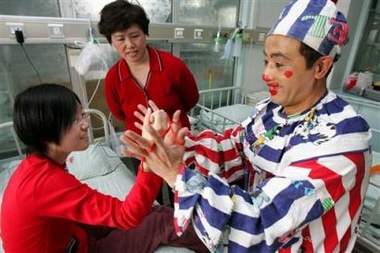Society
China tries using clowns in hospitals
(AP)
Updated: 2006-04-23 14:57
 |
Large Medium Small |
 A clown from the organization Magic Hospital entertains a child in the neurological ward of a children's hospital in Beijing, China on Friday Jan. 27, 2006. [AP] |
|
His attention is focused on clown Liu Yongjun, who, along with his brother Liu Jinjun, has been brightening up the drab wards of two children's hospitals in Beijing since 2003.
With their goofy blue-and-white balloon trousers and magic wands, the Liu brothers are China's first hospital clowns, pioneering the therapeutic benefits of a dose of laughter.
"This type of performance is taking our clowning to a new level," Liu Yongjun said. "It's not about slapstick. We're here to make the kids laugh, to make them forget. It's all about happiness."
The Liu brothers come from a family of acrobats, magicians and jugglers and have been clowning since they were 11. Now in their 50s, they make their living performing at birthday parties, fairs and luxury hotels in China's capital.
They started entertaining sick children when they signed up with the Beijing-based charity Magic Hospital in 2003.
Xinqiao is a big fan. When the Lius visited at Beijing Women and Children's Hospital, the boy had been hospitalized for two weeks and had another 20 days of treatment for a disease his mother would only describe as neurological.
"He has been so listless," she said, wiping saliva from his mouth. "But when he saw the clowns, he was so excited. It was as if he was a normal child again."
Hospital clowns are familiar figures in the West, where doctors and nurses sometimes don frizzy wigs and crack jokes to jolly small patients along the road to recovery. Some children's hospitals have humor carts, stocked with games, comic books and costumes.
But in China, public hospitals are bleak places where strict visiting hours mean children might see their parents just once a week.